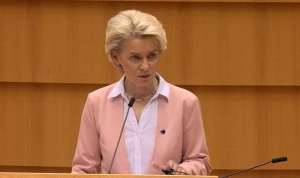• Brussels disproves of subsidies to the chemical industry via farmers
• Michael Mann, EC: "Aid is incompatible with the common market."
• Without fertilizers, crops drop 30%
• Nicolae, Agrostar: "They lied to us! We are preparing to protest!"
• Chemical fertilizers industry is collapsing
If someone imagined that the financial support promised to farmers to enable them to buy chemical fertilizers would solve right away both the problem of chemical fertilizers plants that have no orders and the problem of Romania"s semi-subsistence agriculture and its very small crops was wrong. For two reasons.
First of all, the long awaited subsidy - which was initially 400 RON/ha and then 360 RON/ha and kept busy many fertilizers specialists, as well as the Agriculture minister"s advisor, Vasile Bacila, who is in the fertilizers business - will most likely never happen. It is quite probable that the European Commission will not approve Romania"s proposal to support the domestic agriculture and the chemical fertilizers industry by subsidizing farmers because what the Romanian authorities proposed is a form of State aid.
Minister Ilie Sarbu himself told a press conference yesterday that the intended support for farmers was a form of State aid and implied that chances to have the measure accepted by Brussels were very slim. Considering that the Commission recently rejected a similar application for the exact same reasons, it is quite clear that the verdict, which is due in a few days, will be negative.
Michael Mann, Spokesman for European Commissioner for Agriculture Mariann Fischer Boel, told BURSA that this form of support was incompatible with the principles of the common market and suggested that the only solution to this problem was to apply the minims rules. Interestingly, Mann pointed out that Brussels needed more specific information in order to come to a final stand. Could it be possible that Romania did not prepare its case properly?
Second of all, the optimal period for applying fertilizers is February - March. Even if the Commission approves Romania"s application for permission to disburse farming subsidies, the mere definition of the mechanism by which to implement the aid would push the date too far in the future to accomplish anything this year. Therefore, with fertilizers applied outside the required interval, the aid would become useless. So Minister Ilie Sarbu came to the conclusion it would be best to postpone for this Autumn. "If Brussels agrees with this measure, we will be able to subsidize chemical fertilizers this fall," he said.
However, the application for permission to disburse State aid could change by that time. "If Brussels declines our proposal, we have prepared several backup options," said Secretary of State Catalin Rosculete. Notwithstanding, Minister Ilie Sarbu stressed there was no other option. Are they not playing on the same team? The minister criticized the European Commission"s lack of flexibility on this subject and even suggested that the idea of United Europe cannot work without solidarity.
The fact is that Sarbu dues have good reasons to be upset. First of all, the current Government, which includes his party, PSD, promised farmers before the elections that they would receive a support package for the Spring farming works in the amount of 1,500 RON/ha. In fact, farmers will only receive approximately 1,100 RON/ha, that is, 23% less than promised.
Second of all, the minister is well aware that the lack of fertilizers leads to very small crops per hectare, which are already dangerously low, especially in the current crisis context, when the Government has great expectations from the agriculture as a food crisis is looming. Sarbu also knows that a new conflict with the farmers and with the employees of the chemical fertilizers plants, whose jobs are on the line, is imminent and will not help PSD in the next forthcoming presidential and EU Parliament elections.
"We have done everything we could," Sarbu assured, and even mentioned something about amending Romania"s Accession Treaty to the EU. Since he mentioned the matter of the Treaty and promised to have this issue on the agenda of the next EU Council of Ministers, it is clear that the minister was aware that such aid had not been notified before accession. As attempts to solve the problem were too late, any further steps in this direction seem useless.
Consequently, why did the authorities promise subsidies if they knew it would be very hard to do it? If they did so in order to secure the farmers" votes, they are looking at a boomerang effect. Stefan Nicolae. President of the Agrostar Federation, told BURSA that farmers were extremely displeased with how the matter of the fertilizers was being managed.
He stressed that farmers were preparing to stage protests. "Farmers have been lied to and fooled in the chemical fertilizers affair. Without fertilizers, crops will decrease by 20-30% from an already low level. We are hoping to save at least the Autumn works, because we have no chance to do anything this Spring. We will talk about the kind of protests we want to stage next week," he said.
While farmers still get some support - although less than promised - the chemical fertilizers industry is having severe problems. The plants have no money to finance production, while storage facilities are full with unsold fertilizers. As the demand on the market is almost nil, all hopes were tied to the subsidies for farmers. "Some 6,400 jobs out of the total of 14,000 jobs in the industry are on the line," said Ovidiu Popescu, Vice President of the Federation of Free Chemical and Petrochemical Unions (FLSCP).
The union leader stressed that the Federation would convene to talk about protests next week and warned that a disaster was looming over the chemical industry. "Plants will close, the industry will collapse and we will start importing fertilizers, Popescu concluded.



















































